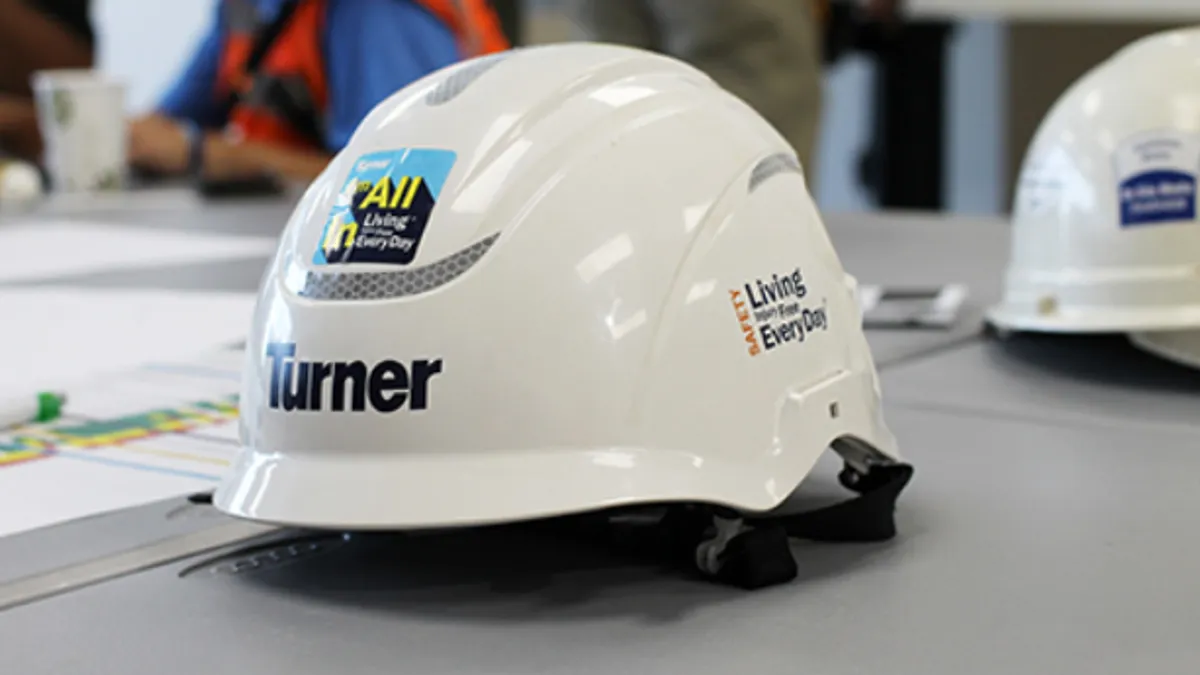Dive Brief:
- Turner Construction, one of the nation's largest contractors, has initiated an enhanced wellness campaign for workers at a multiyear office project in Boston that goes well beyond workplace health and safety, according to a news release.
- Corporate wellness provider Wellness Workdays said Turner hired it to run a “Wellness Trailer 2.0” program at its jobsite to help Turner employees, as well as trade partners, adopt and maintain healthy lifestyles, with an emphasis on both physical and mental well-being. Screenings and prevention are a key aspect of the program.
- “We know the conversation around safety needs to include the topic of substance use/misuse as well as mental health, resilience and physical well-being,” said Bruce Ventura, vice president for Turner in Boston, in the release, adding the firm wants to "promote employee health and wellness, rather than only taking measures to treat illnesses and injuries.”
Dive Insight:
While the program was originally envisioned at Turner about a year ago, before COVID-19 struck, the announcement comes as the pandemic continues to ravage the U.S., in an industry where mental health challenges such as suicide and substance abuse have long been a concern. The coronavirus outbreak has only exacerbated those issues, according to Debra Wein, CEO of Wellness Workdays.
"COVID-19 has caused increased levels of stress, anxiety and financial insecurity," she said. "It's been stressful in all industries, but construction workers have had to deal with the added fact that you can't build something remotely. You have to go to work, which increases the anxiety of whether you're going to get sick."
Other contractors are also upping their outreach to employees. Jacobs recently announced that is is offering a free mental health check-in tool to enhance users' understanding of their current state of mind and provide proactive strategies for personal mental health development. Since launching the program, called "One Million Lives," the tool has been accessed by users to make more than 3,000 check-ins.
By regularly completing a check-in, via the web-based app, users will ideally be better equipped to understand how they are currently coping, assess the early indicators of associated mental health challenges, start positive conversations and get support much earlier, the company said in a statement.
Initially launched with Jacobs' employees and their families, the goal is to now share the check-in tool and resources as widely as possible – extending to clients, partners, supply chain and communities to tackle mental health on a global scale, said Jacobs CEO Steve Demetriou in the statement.
"By sharing the tool and resources as widely as possible, creating a ripple effect across the globe, we want to break down the barriers that hinder honest conversations about mental health and encourage an open culture of support," he said.
A data-driven approach
Turner has had wellness trailers on its jobsites for several years staffed by EMTs, who largely focus on triage in case of an accident, or provide basic first aid for minor injuries. But in the Wellness Trailer 2.0 program, which uses standard construction trailers outfitted to be more welcoming and comfortable, the medical professional onsite will also engage in wellness coaching with workers.
The new program builds on Turner's nationwide L.I.F.E. safety program — short for Live Injury Free Every Day — and its more recent Active Caring initiative, which aims at expanding inclusivity and employees' and trade partners' quality of life on the jobsite.
It will do so via prevention and screening programs, where workers will sit down for a 30-minute conversation with a health coach to establish a baseline about their lifestyle — how often they exercise, whether they smoke, how many drinks they have a week — as well as take biometric measures for blood pressure, cholesterol and glucose. Employees will then receive wellness coaching on steps they can take to maintain better health on and off the jobs.
Those initial screenings, which are voluntary, will help Wellness Workdays and Turner to establish benchmarks that can be used to determine what areas of focus the wellness program onsite should have to benefit the largest cohorts of the population, whether that means targeting depression, substance use or simply eating more healthy.
Wellness Workdays will then feed the anonymized individual health data into its proprietary software to track and analyze outcomes over time.
"We can use the initial assessments to focus on individuals, but now we can also track and say of these 5,000 people, this many people now have lower blood pressure, or aren't complaining of that lower back pain any longer," said Wein, who noted the average participation rate among its clients in its wellness programs is around 80%. "So the software employs physician-driven protocols to drive the health coaching process. We are data driven."
While neither Turner nor Wellness Workdays disclosed the cost of the program, Ventura said the ability to track health outcomes via data will help justify it from a business perspective. But he also said there will almost automatically be a return that goes beyond dollars and cents, especially in the midst of the pandemic.















